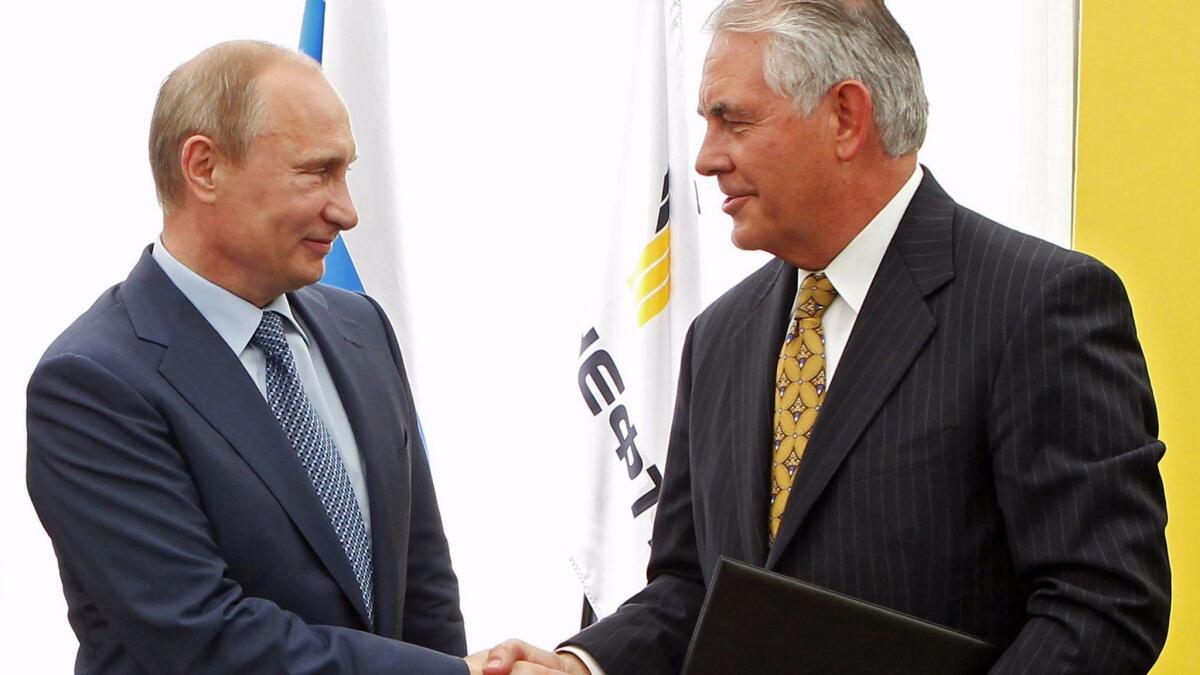Op-Ed: Rex Tillerson could be a good secretary of state — but not in a Trump administration

Exxon Mobil CEO Rex Tillerson is by all accounts a shrewd, pragmatic and successful dealmaker. In another administration, he might have made an excellent secretary of State.
Serving a president with a strong moral grounding and certain fixed principles, such as Ronald Reagan or George W. Bush, he might have been successful in sanding off the rough edges and making the compromises necessary to get things done. But under Donald Trump, a man of few if any discernible principles beyond a desire for self-aggrandizement, he would be a dangerous choice because his role will be not just to implement policy but — more than most previous secretaries of State — to shape it.
As far as most foreign policy issues go, Tillerson is a tabula rasa. What does he think about the U.S. alliance with Israel? The U.S. policy toward Pakistan? The future of NATO? The North Korean nuclear program? Chinese aggression in the South China Sea? Syria and Iraq, Libya and Yemen? No one knows because he seldom has opined in public about non-energy issues.
If the Senate confirms Tillerson, U.S. sanctions on Russia likely won’t survive the administration’s first 100 days.
To the extent that Tillerson has a track record, it is as an amoral businessman who has never hesitated to work with some of the world’s most repressive and corrupt regimes in places such as Equatorial Guinea, Nigeria, Venezuela, Vietnam and of course Russia. Tillerson himself has said that he has “a very close relationship” with former KGB agent Vladimir Putin. He has negotiated multibillion-dollar oil deals with the state-controlled Rosneft oil company run by Putin crony Igor Sechin, another former KGB man, and he lobbied against the imposition of U.S. sanctions on Russia after its invasion of Ukraine in 2014.
It’s hard to imagine Putin appointing as his foreign minister someone who received a Medal of Freedom from America’s president, yet Tillerson received the Order of Friendship from Putin. Little wonder that pro-Kremlin commentators see his selection as “some kind of Christmas gift from the American people to the Russian people” — or, more properly, from Trump to Putin.
It’s quite possible, as contended by former Secretary of Defense Bob Gates and former Secretary of State Condoleezza Rice (whose consultancy counts Exxon Mobil as a client), that Tillerson has no particular love for Putin and simply was doing what was best for his shareholders. But if Tillerson is not in favor of appeasing Russia, he has given no hint of it in the past. And if he is in favor of appeasing Russia, he will find little pushback from Trump, who has defended the Russian strongman from well-founded accusations that he murders his political opponents and meddled in the U.S. election.
Trump’s national security advisor, retired Lt. Gen. Michael Flynn, also appears favorably predisposed toward the Kremlin. Last year, he accepted payment to attend a banquet in Moscow for the Kremlin’s propaganda television station, RT, where he sat at a table near Putin himself.
Both Trump and Flynn seem to view Russia as an ally against Islamist extremism, which they believe is the No. 1 threat to the United States. Trump has even spoken of cooperating with Russia in Syria, where Putin’s air force is helping the Assad regime slaughter civilians and moderate rebels in Aleppo.
In reality, the U.S. and Russia do not have congruent interests in Syria or most other places. Putin wants to prop up a pro-Iranian, anti-Israeli strongman; the U.S. goal should be to bring the civil war to an end in such a way that neither Sunni nor Shiite extremists are empowered. More broadly, the U.S. should be containing, rather than enabling, Putin as he attempts to resurrect the Russian empire and to dominate American allies in Eastern Europe.
The new secretary of Defense, retired Marine Gen. James Mattis, undoubtedly understands these realities, as does Marine Gen. Joseph Dunford, the chairman of the Joint Chiefs of Staff, and the new CIA director, Rep. Mike Pompeo of Kansas. They can be expected to argue against a pro-Putin policy, and they might carry the day if they were to have the support of a secretary of State like former presidential candidate Mitt Romney, retired Gen. David Petraeus or retired Adm. James Stavridis, all of whom understand the nature of the Russian threat and the value of alliances such as NATO. But if the Senate confirms Tillerson, U.S. sanctions on Russia likely won’t survive the administration’s first 100 days — and if they are lifted, Putin will see that as a license for further aggression.
Congress will be able to do little if President Trump pursues a pro-Putin policy, but by rejecting Tillerson now, lawmakers can at least signal that not all Americans are ready to kneel before the Russian strongman.
Max Boot is a senior fellow at the Council on Foreign Relations. He is a contributing writer to Opinion.
Follow the Opinion section on Twitter @latimesopinion and Facebook
More to Read
A cure for the common opinion
Get thought-provoking perspectives with our weekly newsletter.
You may occasionally receive promotional content from the Los Angeles Times.





